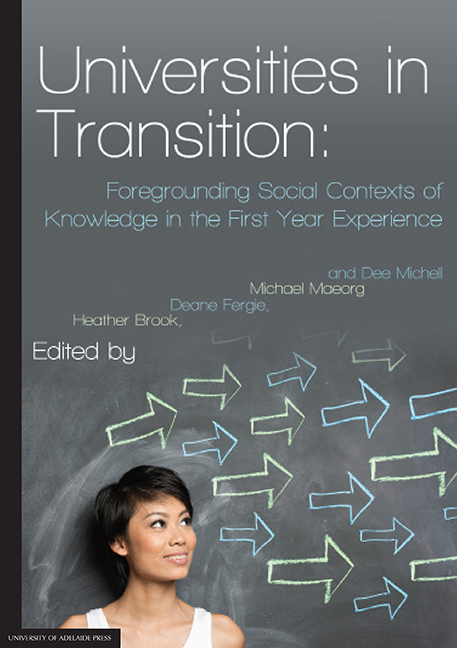Book contents
- Frontmatter
- Contents
- Notes on Contributors
- Introduction
- Part 1 Reconceptualising: transition and universities
- Part 2 Revaluing: ‘non-traditional’ student groups in higher education
- 3 Classism on campus? Exploring and extending understandings of social class in the contemporary higher education debate
- 4 Reframing ‘the problem’: students from low socio-economic status backgrounds transitioning to university
- 5 Changing social relations in higher education: the first-year international student and the ‘Chinese learner’ in Australia
- 6 Relating experiences: Regional and Remote students in their first year at university
- Part 3 Realising: transformations on campus
4 - Reframing ‘the problem’: students from low socio-economic status backgrounds transitioning to university
from Part 2 - Revaluing: ‘non-traditional’ student groups in higher education
Published online by Cambridge University Press: 05 December 2014
- Frontmatter
- Contents
- Notes on Contributors
- Introduction
- Part 1 Reconceptualising: transition and universities
- Part 2 Revaluing: ‘non-traditional’ student groups in higher education
- 3 Classism on campus? Exploring and extending understandings of social class in the contemporary higher education debate
- 4 Reframing ‘the problem’: students from low socio-economic status backgrounds transitioning to university
- 5 Changing social relations in higher education: the first-year international student and the ‘Chinese learner’ in Australia
- 6 Relating experiences: Regional and Remote students in their first year at university
- Part 3 Realising: transformations on campus
Summary
Abstract
As higher education populations further diversify, new thinking and approaches are needed to ensure the successful transition to university of all students who are given access to higher education. This chapter challenges the notion of the student as ‘the problem’ when considering the transition to university of students from low socio-economic status (SES) backgrounds. Based on an examination of key literature from Australia, New Zealand, the United Kingdom and North America, this chapter argues that a deficit conception of students from low SES backgrounds is limited. It further argues that a deficit conception of the institutions into which these students transition is equally limited. Drawing on a recent national study (Devlin et al., 2012), this chapter examines a recently developed new conception, which positions successful transition to university for students from low SES backgrounds as a joint venture toward bridging socio-cultural incongruity (Devlin, 2011). This new conception privileges the agency, experience and contributions that these students bring to higher education, as well as institutional efforts to help students make the transition. The chapter proposes teaching and learning the discourse as a critical way to contribute to bridging socio-cultural incongruity and thereby assist students from low SES backgrounds to transition successfully to university.
Introduction
In an increasingly massified higher education system with greater numbers of students from low socio-economic status (SES) backgrounds studying alongside more traditional cohorts of students, it is not only appropriate, but also essential, that institutions work towards successful experiences for all students (Devlin, 2010).
- Type
- Chapter
- Information
- Universities in TransitionForegrounding Social Contexts of Knowledge in the First Year Experience, pp. 97 - 126Publisher: The University of Adelaide PressPrint publication year: 2014

